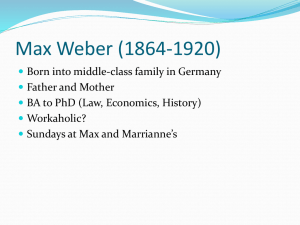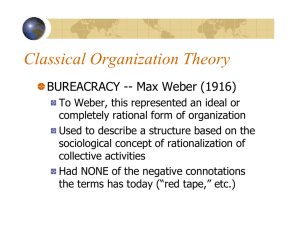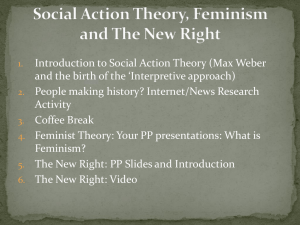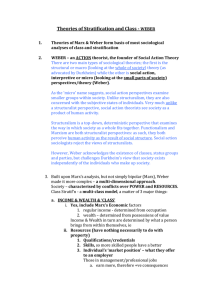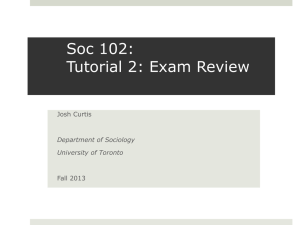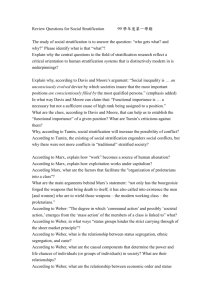Max Weber 2
advertisement
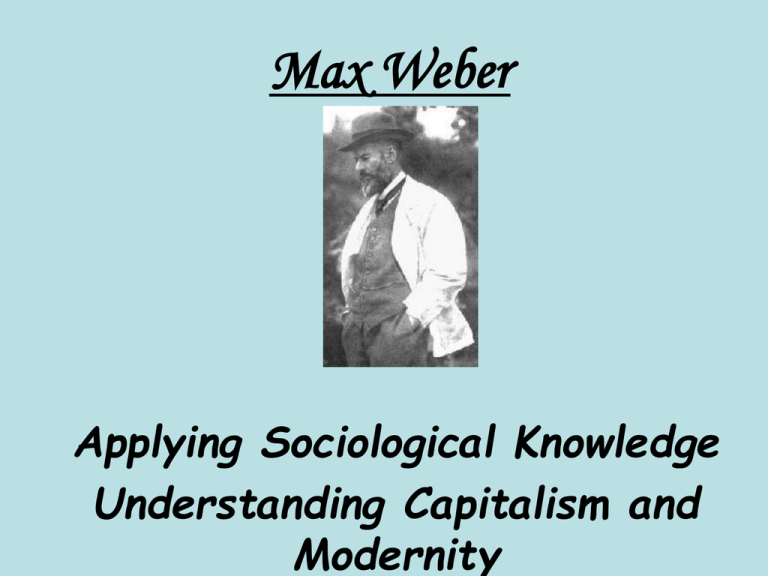
Max Weber Applying Sociological Knowledge Understanding Capitalism and Modernity ISSUES 1. Weber’s view of modern society - The “Iron Cage” 2. Weber applies his methods - How good are his methods? 3. Weber versus Marx - Differences & similarities OUTLINE 1. 2. 3. 4. 5. 6. 7. 8. 9. Weber’s life Weber’s view of modern society Weber’s methods: recap Applying methods to modern society Weber & Marx Weber: the rise of capitalism (Weber & Marx – again) The “Iron Cage” Evaluation Weber’s Life Born in Germany 1864 – 1920 - Rapid social change / industrialisation - Development of government bureaucracy Politics: German nationalist But anti-authoritarian Studies: history, economics, religious studies, sociology Against positivism / For interpretivism Weber’s view of modern society 1) Modernity very unlike other societies 2) Capitalism (but view differs from Marx’s) - Psychology of capitalism 3) Highly “rationalised” - Ways of thinking: science, calculation - Beliefs: secularisation - Ways of organising people: bureaucracy Weber’s Methods: Recap Interpretivism: Study what people think / why they act “Verstehen” / Empathic understanding Neo-Kantian methodology: Reality is complex Must simplify reality Must build ideal types e.g. “bureaucracy” Weber’s Methods: Recap Sociology = study of social action 4 types of action: 1. Habitual (traditional) 2. Affective (emotional) 3. Value rational (beliefs) 4. Instrumental (or goal) rational (calculation / efficiency) Any actual action a mixture of some or all Weber’s Methods: Recap Types of Authority Authority = legitimate power Power of rulers to get ruled to do things Ruled see power of rulers as legitimate 3 types of authority: Traditional / charismatic / legal-rational Weber’s Methods: Recap Value freedom All studies are biased; must admit biases Don’t pass off your biases as “the truth” Value relevance Reality vastly complicated Researcher must choose what to emphasise, what to downplay or miss out Researcher’s interests shaped by personal & cultural factors Weber’s Methods: Recap One-sided viewpoints Reality complicated – multiple factors Researcher can only look at some things Any research is one-sided 2 problems: Being unaware your research is one-sided Passing off a one-sided viewpoint as “the truth” Applying Methods to Modern Society Development of modern society: many factors In one study: must select some factors e.g. Protestant Ethic study: religious factors Overall: multi-dimensional analysis - Look at as many factors as possible e.g. religion, economics, politics, bureaucracy - Try to relate them all together Applying Methods to Modern Society Ideal Types Reality complex; must simplify Ideal type: “perfect” model of a thing Allows us to - See things more clearly - Compare model against reality Protestant Ethic Spirit of Capitalism Bureaucracy Applying Methods to Modern Society Wants to look at as many factors as possible BUT inevitability of value relevance – having to be selective Weber’s focus (1) (of 3) - Look at ways people think; their motivations for acting Applying Methods to Modern Society Emphasises role of new ways of thinking in creating a new sort of society New ways of thinking motivate new ways of acting New religion: Protestantism (Luther, Calvin) - New way of thinking 1: more calculating mindset - New way of thinking 2: making money is moral Protestant Ethic helps create new “Capitalist Spirit” - Calculating most efficient ways to make profits Applying Methods to Modern Society Weber’s focus (2) Sees modern society as highly “rational” 1) Dominance of instrumental rationality: calculating most efficient ways of achieving goals 2) Ways of thinking: - scientific mindset; - capitalist search for profit 3) Social organisation: bureaucracy Emphasises “rational” factors Downplays “irrational” factors Weber’s focus (3) Western Europe & North America - since 16th century: unique & unprecedented social changes - most human history: slow change, tradition a) Rise of capitalist society - Industrialisation / new classes: capitalists & workers b) Secularisation c) Democratisation Focus (3) WHY DID THESE CHANGES HAPPEN IN THE WEST AND NOWHERE ELSE?? Compare West to: India, China & Japan Find what is unique to the West Answer: ways of thinking / religion Eastern religions: emphasise tradition / not dynamic / don’t encourage social change Western religions: Judaism, Christianity / emphasise change & social transformation West is religiously dynamic, East static Weber & Marx Ideal factors: religion, values, ways of thinking, “culture” (“superstructure”) Material factors: economy, production, division of labour (“economic base”) Marx: material factors more important than ideal factors Social change = material factors change first, then ideal factors follow Changes in economic base changes in social superstructure Marx: the rise of capitalist society Changes in Economic Base: 1) New technology: from farming to factories 2) New classes: capitalists & workers 3) Capitalists take wealth & power away from aristocracy LEADS TO Changes in Social superstructure (i.e. changes in all other parts of society e.g. politics, law, family, media, etc.) Weber’s criticisms of Marx 1) - Marx has a one-sided viewpoint Emphasises “material” factors Thinks this is the whole story OVERemphasises material factors 2) UNDERemphasises “ideal” factors - Especially religion: Protestantism - Doesn’t examine new ways of thinking, new motivations - Weber corrects this in Protestant Ethic study 3) Marx is not multi-dimensional enough a) Emphasises economic factors But reality is complex: many factors involved b) Must also look at political and cultural factors (especially, but not only, religion) c) Marx’s story only starts in the 16th century; must go back much further in time: - Rational thinking in West since ancient Greeks - Bureaucracy since the ancient Romans - Medieval Catholic Church is a bureaucracy Weber: the rise of capitalism PROTESTANT ETHIC (PE) 16th century: northern Europe Rebellion against Catholic teaching Luther and Calvin More “pure” version of Christianity Calvin: “damned” and “saved” Chosen at birth Psychological anxiety (“salvation anxiety”) Do “good works” – work hard EFFECTS OF PE ON SOCIETY Medieval economy: - subsistence economy Attitudes: - leisure more important than work; - work a necessary evil; - making money is immoral Protestant Ethic (PE): - work hard to show you are good - making money a sign of virtue Over time: work hard; make money Spirit of Capitalism (SC): - secular version of PE; - becomes automatic; no religious aspect PE leads to SC leads to social transformation Spirit of Capitalism 1) Main aim in life: work hard, seek profits 2) Capitalism exists in many societies, including pre-modern societies e.g. piracy: make money by stealing 3) Modern capitalism (“Spirit of Capitalism”) - Never-ending search for profits - Calculate most efficient methods - Keep accurate records: book-keeping - Don’t waste profits; reinvest in business - “Time is money” Weber & Marx: again DISAGREEMENTS: Marx: material factors (economic base) Weber: ideal factors as important (religion, Protestant Ethic) as material factors Weber: 1) Marx’s view TOO one-sided 2) Marx created an ideal-type (base-superstructure model ) BUT Marx forgets it’s just a model, just one way of looking at things 3) Marx stresses class over other types of social group e.g. gender-based, ethnic-based, status-based Weber & Marx: again PARTIAL AGREEMENTS Weber: Marx right to look at economic factors (appearance of new classes; new technology) Weber: must look at BOTH material and ideal factors Weber: Marx on the right track; but not multidimensional enough Weber against Marx? Weber correcting Marx’s limitations Weber adds to Marx The “Iron Cage” Modern society created by rationalization processes: 1) Increasing levels of instrumental rationality Scientific mindset Decline of religious belief (“Disenchantment of the world”) Instrumental rationality (calculation) KILLS OFF value rationality (beliefs & values, esp. religious) The “Iron Cage” 2) Increasing bureaucratisation Bureaucracy – ideal type: a) Organising people with written rules b) Rules enforced impersonally c) Hierarchical organisation d) Specialisation of tasks Bureaucrats rule Spread of bureaucracy into all spheres of life e.g. family, private life The “Iron Cage” 3) Increasing impersonalization of social relations: a) Calculation, not imagination & feelings b) Actions more and more automatic - Work hard, without knowing why - Seek money, at expense of other things c) Division of labour: Everyone is a specialist One-sided personalities (all people, not just workers) The “Iron Cage” SOLUTIONS: Marx: Communism - Government controls economy - More and more bureaucracy Weber: - try to salvage whatever individual freedoms are left - not much chance of this EVALUATION PROS: 1) More detailed account of rise of modernity than Marx more sophisticated than Marx? 2) Deals with more factors than Marx: - material AND ideal - goes back further in history 3) Sophisticated methods (including admitting his own biases) CONS: 1) Too pessimistic about modern society? 2) Breaks His Own Rules? - Gives a very negative one-sided account of modern society - Presents it as “the truth” 3) Problems with methods problems with his view of rise and nature of modern society
